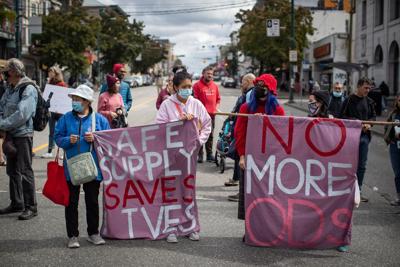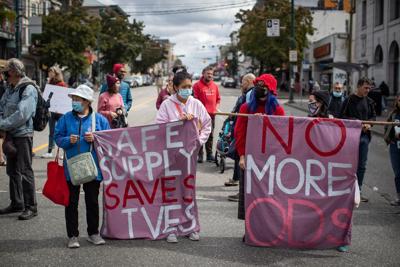
From The Star, by Manisha Krishnan Read the full story
In an ideal world, drug policy would be decided by public health experts rather than politicians and cops. But that’s not the reality we live in.
On the contrary, we’re at a point in time where misinformation has never been more rampant, and sensational coverage can be easily weaponized by those with agendas, making it even more critical for reliable journalism to fill the gap.
“Misleading articles can increase stigma against people who use drugs, skew the public’s understanding of the issue, inspire bad-faith policy and make it more difficult for other journalists to gain the trust and respect of marginalized communities,” Manisha Krishnan writes.

By Manisha Krishnan, Contributor
In an ideal world, drug policy would be decided by public health experts rather than politicians and cops. But that’s not the reality we live in.
On the contrary, we’re at a point in time where misinformation has never been more rampant, and sensational coverage can be easily weaponized by those with agendas, making it even more critical for reliable journalism to fill the gap.
When it comes to reporting on North America’s overdose crisis — the worst in our history — misleading articles can increase stigma against people who use drugs, skew the public’s understanding of the issue, inspire bad-faith policy and make it more difficult for other journalists to gain the trust and respect of marginalized communities.
Which brings me to a splashy, new piece of drug journalism from U.K.-based newspaper the Telegraph, falsely claiming that decriminalizing the possession of small amounts of drugs “made Vancouver the fentanyl capital of the world.”
The Telegraph’s story, like others before it, makes a number of other misleading claims, including stating that safe supply programs, which provide pharmaceutical alternatives to street drugs, are making the situation worse because that supply is being sold to street users, including young people. Some safe supply is being diverted, but there is no evidence that it’s led to more deaths or teens forming new addictions.
While dressed up as enterprise reporting, complete with graphic photos of people overdosing, the story uses the same tropes I see all the time in drug reporting in North America, reducing people who use drugs to their lowest moments and claiming that harm reduction has given them a “free ride” to get high without consequence. It gets many facts wrong, including stating without evidence that decriminalization has caused a huge spike in public drug use and “allowed an opioid crisis to take hold that surpasses even the epidemic in the United States.”
The latter comparison of a city to an entire country doesn’t make sense, but even on a city to city basis, Vancouver’s fatal overdose rate of 68.4 per 100,000 people is not as dire as at least 15 U.S. cities.
Reporting like this misses important context about the drug crisis, allowing politicians to drum up fear about harm reduction rather than confront how decades of prohibition have impacted the current fentanyl crisis. After the 2010s crackdown on prescription pain pills, many people dependent on opioids turned to heroin instead. Eventually, drug traffickers began cutting heroin with fentanyl, a synthetic opioid 50 times stronger, that is also cheaper and simpler to make and smuggle.
Fentanyl first showed up in B.C.’s drug supply around 2013 and its prevalence prompted the province to declare a public health emergency in 2016 seven years before the three-year decriminalization pilot project was implemented.
Fatal overdose rates in B.C. have fallen since decriminalization took effect in January 2023, when there were 7.4 fatal overdoses a day compared to 6.1 in April, casting even more doubt on the Telegraph’s central thesis. It’s worth noting that proponents of decriminalization don’t expect it to drastically reduce drug deaths, a feat that can only be accomplished by addressing the toxic drug supply. It can help prevent overdoses, as those who use drugs alone are more likely to die because there’s no one around to help them. But primarily, it’s a policy that’s meant to ensure that some of the poorest and sickest people in society aren’t criminalized for using drugs, a burden disproportionately shared by Black and Indigenous Canadians.
In the case of the Telegraph, global health editor Paul Nuki defended the piece against what he characterized as “culture war” criticism.
“The introduction of the scheme has made Vancouver’s fentanyl problem worse, not just in terms of lives lost, but for the social and cultural fabric of the city,” he wrote on X.
And therein lies the real problem so many people have with decriminalization. They don’t want to see people using drugs in public because it disturbs them. Obviously people deserve to feel safe in the cities they live in, but public drug use in Vancouver didn’t start with decriminalization. It’s long been commonplace, particularly in the Downtown Eastside, and made worse by a lack of housing and mental health services, a global pandemic and an increasingly volatile drug supply. Governments and news outlets should focus more attention on addressing those root causes, rather than blaming a year-and-a-half old policy that’s already been gutted.
Tensions over how to deal with the overdose crisis have never been more fraught and, with record-breaking deaths, they’ve never been more consequential.
Last week Conservative leader Pierre Poilievre, who shared the Telegraph’s piece, said if elected prime minister, he would try to close drug consumption sites, which he referred to as “drug dens.” No one has ever died at one of these sites, but tens of thousands of lives have been saved. This comes at a time when there’s a moral panic over safe supply and places like Alberta are moving away from harm reduction, in spite of record overdoses. In the U.S., Oregon has reversed drug decriminalization, cities are systematically cracking down on needle exchanges and homeless people are being punished for sleeping in public.
Perpetuating false narratives about the few programs that are trying a more humane approach only gives ammunition to those trying to shut them down and then we’ll be told that the war on drugs, the same strategy that got us to this point, is the solution.
That’s a story I’m tired of hearing.
Manisha Krishnan is an Emmy award-winning journalist who covers drug policy.
Leave a Reply
You must be logged in to post a comment.